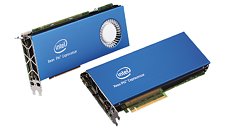Wednesday, June 20th 2018

Raja Hires Larrabee Architect Tom Forsyth to Help With Intel GPU
A few months ago we reported that Raja Koduri has left AMD to work at Intel on their new discrete GPU project. Looks like he's building a strong team, with the most recent addition being Tom Forsyth who is the father of Larrabee, which was Intel's first attempt at making an x86-based graphics processor. While Larrabee did not achieve its goal and is considered a failure by many, it brought some interesting improvements to the world, for example AVX512, and is now sold under the Xeon Phi brand.
Tom, who has previously worked at Oculus, Valve, and 3DLabs posted on Twitter that he's joining Intel in Raja's group, but he's "Not entirely sure what he'll be working on just yet." At Oculus and Valve he worked on Virtual Reality projects, for example he wrote big chunks of the Team Fortress 2 VR support for the Oculus Rift. Taking a look at Tom's papers suggests that he might join the Intel team as lead for VR-related projects, as that's without a doubt one of Raja's favorite topics to talk about.
Sources:
Twitter Announcement, All Papers by Tom Forsyth
Tom, who has previously worked at Oculus, Valve, and 3DLabs posted on Twitter that he's joining Intel in Raja's group, but he's "Not entirely sure what he'll be working on just yet." At Oculus and Valve he worked on Virtual Reality projects, for example he wrote big chunks of the Team Fortress 2 VR support for the Oculus Rift. Taking a look at Tom's papers suggests that he might join the Intel team as lead for VR-related projects, as that's without a doubt one of Raja's favorite topics to talk about.


11 Comments on Raja Hires Larrabee Architect Tom Forsyth to Help With Intel GPU
Keep living in fantasy land Koduri
I think the most we can hope for in a first generation release is a competitor to the low-mid range Nvidia cards, xx50, xx60, where the vast majority of profits are made in the GPU space. Intel, as always, will follow the money, not the glory of having the fastest.
As for the whole Intel graphics thing, Intel is really throwing cash left and right for this one. I kinda hope they succeed and become a 3rd graphics player. That would be nice for consumers, especially knowing Intel generally has good products.
Off-topic: Now, since we haven't seen a RY Zen 3 2300u laptop and and one with the RY Zen 3 2200u is absurdly high in price, I was thinking of going Intel for my next laptop. The only thing is that I hear people talk about how their drivers are bad. I'm more for the processor but I want to play some games(nothing demanding) on my spare time. (Gathered some Amazon Gift Cards, so only relying on that. I know bad move, but it'll be my go to for now.)
On-topic: As for the graphic cards, I'm not expecting GTX 1080Ti competitor either. The good thing going will be competition and prices being reasonable.
Traditionally, the last decade or two, Intel's struggled with low margin products ~ especially looking at the billions that went up in smoke chasing after Apple & Samsung in the mobile market!
Assuming they can't match the 1180Ti, then they'll have to compete with AMD, Nvidia in the mid range segment, possibly upto 1180? Can Intel compete in the mass market segment with thin margins & a possible hit to their brand value? Also what about perf/w & absolute performance? Can Intel afford to sell a GPU as an also ran & still make decent amount of money? The flagship segment not only increases Nvidia's revenues but swells their profits as well, the same as Intel's CPU division. Is Intel willing to fight it out with Nvidia, AMD with low(er) margins & value play, possibly diminishing their premium brand?Then there's the thing about enterprise vs consumer, is the GPU ultimately their answer for Nvdia or AMD in the HPC segment? Are they willing to risk a move away from x86 towards GPGPU & possibly aiding the competition by accelerating a GPU oriented compute environment, even in data centers?
Intel's probably initially gonna test the waters with mid/high range GPU & would be looking to remove both AMD & Nvidia in OEM systems (with dGPU) & notebooks. Their enterprise strategy isn't clear & is totally shrouded in mystery!
Tons of VR games and VR users. The application is far beyond just gaming. VR is revolutionizing scientific research and industry.
www.ncbi.nlm.nih.gov/pmc/articles/PMC5333173/
www.ncbi.nlm.nih.gov/m/pubmed/29916601/?i=2&from=virtual%20reality
www.ncbi.nlm.nih.gov/m/pubmed/29897886/?i=14&from=virtual%20reality
You choose not to see it doesn’t mean the rest the world are blind